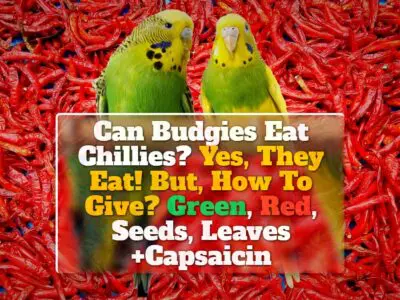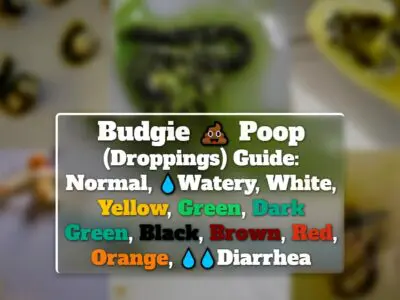Yes, budgies can safely eat chillies, including green, red, or yellow varieties.
Remove seeds and stems before serving.
While capsaicin, which is responsible for the heat in peppers, does not affect budgies as they lack capsaicin receptors, avoid feeding budgies with spicy or hot peppers.
As a bird enthusiast and former budgerigar owner, I have asked a lot of questions and researched the nutritional needs of budgies in a timely manner.You’ve probably come across this question, ‘Can my budgie eat peppers?’ Well, the short answer is yes, budgies can indeed eat peppers.
But, as always, the devil is in the details.
Can Budgies Eat Pepper Flesh?
Yes, budgies can eat pepper flesh, which refers to the edible part of the pepper fruit.
The flesh of peppers, especially mild varieties like green, red, and yellow bell peppers, is safe and beneficial for budgies.
It contains a variety of essential nutrients, including vitamins, minerals, and antioxidants.
To offer pepper flesh to your budgie, remove the stem, seeds, and any too spicy or too hot varieties.
Can Budgies Eat Pepper Seeds?
While peppers offer a buffet of nutritional benefits for our budgie friends, pepper seeds fall into a gray area.
Although these seeds are not toxic, solid seeds could pose a potential harm to digestive track. So, when you’re serving up a pepper snack for your feathered friend, it would be best to remove the seeds first.
Variety is also key when it comes to a budgie’s diet.
Even though the pepper seeds aren’t harmful per se, they don’t provide the full spectrum of nutrients that your budgie requires.
Can Budgies Eat Red Pepper?
Yes, budgies can safely eat red pepper.
Red peppers are also rich in vitamin C, B vitamins, high in vitamin A, which supports skin health, eye health, a healthy immune system and vital minerals like potassium and magnesium.
Can Budgies Eat Green Pepper?
The verdant green pepper, less sweet but equally nutritious as its red sibling, is another pepper variant that budgies can enjoy.
Green peppers, like other peppers, are packed with vitamins A, C, E, and an array of B vitamins.
They also offer dietary fiber, which aids digestion and can help keep constipation at bay.
To ensure your budgie reaps the full benefits, serve the pepper without the stem and seeds.
Can Budgies Eat Yellow Pepper?
Yes, yellow peppers are a go for budgies too! These peppers are not just colorful additions to a budgie’s diet, they’re also nutrition powerhouses.
Just like red and green peppers, yellow peppers offer a mix of vitamins and minerals that are beneficial for your budgie’s health.
They are especially high in vitamin C and provide a decent amount of dietary fiber.
Can Budgies Eat Bell Pepper?
Well, bell peppers are not only colorful but also packed with nutrition, making them an excellent addition to your budgie’s diet.
Bell peppers, regardless of their color, contain high levels of vitamins A and C, as well as dietary fiber and essential minerals.
They are also low in sugar and virtually fat-free, which is excellent news for maintaining your budgie’s optimal health.
Can Budgies Eat Pepper Leaves?
Now, when it comes to pepper leaves, it’s a different ball game.
To be on the safe side, it’s best to avoid giving pepper leaves to your budgie.
While the fruit part of the pepper plant is safe and nutritious for budgies, not all parts of a plant are necessarily safe for them to consume.
Not much information is available about the safety of pepper leaves for budgies, so it’s better to err on the side of caution.
Can Budgies Eat Pepper Stem?
As with pepper leaves, pepper stems should also be avoided.
The stem of the pepper isn’t as nutritious as the fruit.
Always remember to remove the stem along with the seeds before feeding peppers to your budgie.
This way, you’ll ensure that your feathered friend only gets the best and safest parts of this tasty treat.
Can Budgies Eat Pepper Powder?
While budgies can safely eat peppers, pepper powder is not recommended.
The powdered form of peppers might contain added ingredients like salt or preservatives, which aren’t suitable for budgies.
Furthermore, the fine particles of the powder could potentially cause respiratory issues if inhaled by your bird.
So, for the sake of your budgie’s health, it’s best to stick with fresh, raw peppers.
Can Budgies Eat Dried Chillies?
Dried chillies are not a common food for budgies, but they can eat them.
However, like with all foods, dried chillies should be given in moderation and as part of a balanced diet.
Ensure the dried chillies are free from added salt or other preservatives, as these can be harmful to your budgie.
Can Budgies Eat Pepper Flowers?
I’m afraid I don’t have definitive information about whether budgies can safely eat pepper flowers.
While some parts of the pepper plant, like the fruit, are safe for budgies, it doesn’t automatically mean that all parts are safe.
In situations like this, it’s best to play it safe and avoid giving pepper flowers to your budgie.
Instead, stick with the tried and true parts of a budgie’s diet, including fresh peppers (minus the seeds and stem), other safe fruits and vegetables, and high-quality bird pellets.
Why Do Mammals Feel Pain When Eating Peppers, While Budgies Can Eat Peppers Without Pain?
The reason why mammals like humans feel pain or a burning sensation when eating peppers, while birds such as budgies don’t, has to do with a compound found in peppers called capsaicin.
This molecule interacts with a specific receptor in the sensory neurons of mammals, called the TRPV1 receptor, which responds to heat and pain.
When capsaicin binds to this receptor, it triggers a sensation of heat or burning.
On the other hand, budgies and other birds lack the specific sensory receptors that respond to capsaicin.
Therefore, when they eat peppers, they do not experience the heat or pain that mammals do.
This adaptation is advantageous for pepper plants because birds can consume and disperse their seeds over great distances, aiding in the plant’s propagation.
Do Budgies Like To Eat Peppers?
Yes, budgies generally enjoy eating peppers.
They seem to be particularly fond of the crunchiness and juiciness of fresh peppers.
Additionally, they’re not sensitive to capsaicin, the compound that gives peppers their spicy heat, so they can happily munch on even the hottest varieties.
However, just like with humans, individual tastes can vary, and some budgies may prefer other fruits or vegetables over peppers.
What Are The Benefits Of Budgies Eating Peppers?
Peppers, especially bell peppers, are nutrient-dense food items that can be beneficial for budgies.
They contain numerous vitamins and minerals and are a good source of dietary fiber.
Importantly, they provide substantial amounts of vitamin A and vitamin C.
They also contain B vitamins, vitamin E, vitamin K, and essential minerals, along with being a source of various phytochemicals.
Additionally, peppers are low in sugar and fat, making them an excellent choice for a healthy budgie diet.
Nutritional Values Of Peppers And Benefits For Budgies
Below is a table summarizing the nutritional composition of 100 grams of raw, red bell peppers and their benefits for budgies:
| Nutrient | Amount (Metric) | Amount (Imperial) | Benefit for Budgies |
|---|---|---|---|
| Energy | 31 kcal | 31 kcal | Provides energy |
| Water | 92.21 g | 3.25 oz | Hydration |
| Protein | 0.99 g | 0.03 oz | Supports growth and maintenance of body tissues |
| Total lipid (fat) | 0.30 g | 0.01 oz | Essential for energy and absorption of fat-soluble vitamins |
| Carbohydrate | 6.03 g | 0.21 oz | Provides energy |
| Fiber, total dietary | 2.1 g | 0.07 oz | Aids digestion |
| Sugars, total | 4.20 g | 0.15 oz | Provides energy |
| Calcium, Ca | 7 mg | 0.00024 oz | Bone health |
| Iron, Fe | 0.43 mg | 0.000015 oz | Oxygen transport in blood |
| Vitamin A, IU | 3131 IU | 3131 IU | Eye health and immune function |
| Vitamin C, total ascorbic acid | 127.7 mg | 0.0045 oz | Antioxidant; tissue repair and growth |
| Vitamin E | 1.58 mg | 0.000056 oz | Antioxidant; healthy skin and feathers |
| Vitamin K | 4.9 µg | 0.00017 oz | Blood clotting; bone health |
| B Vitamins (Thiamin, Riboflavin, Niacin, B6, Folate) | Varies | Varies | Energy metabolism, nerve function, and maintenance of skin and feathers |
| Phytochemicals (Capsaicin, Carotenoids, Flavonoids) | Present in varying amounts | Present in varying amounts | Antioxidant and anti-inflammatory properties |
(Source: USDA National Nutrient Database, WebMD, NutritionValue.org)
Vitamin A
Vitamin A is an essential vitamin for budgies.
It plays a crucial role in maintaining good vision and supporting the immune system.
It is also involved in the growth and repair of body tissues, making it important for the health of the skin and feathers.
Vitamin C
Vitamin C is a potent antioxidant that helps protect the body against damage from free radicals.
For budgies, vitamin C supports tissue repair and growth, and it also aids in the absorption of iron, an essential mineral for the transport of oxygen in the blood.
Fiber
Dietary fiber is important for budgies as it aids in digestion.
Fiber can help promote regular bowel movements and maintain a healthy digestive tract, which is crucial for overall health in budgies.
Vitamin E
Vitamin E is another powerful antioxidant, playing a role in protecting cells from damage.
It also aids in maintaining healthy skin and feathers in budgies, contributing to their overall well-being and appearance.
Vitamin K
Vitamin K is crucial for the blood clotting process and aids in maintaining strong bones in budgies.
B Vitamins
B vitamins, including thiamin, riboflavin, niacin, and B6, play a critical role in the energy metabolism of budgies.
They are also essential for nerve function and the maintenance of healthy skin and feathers.
Minerals
Peppers contain essential minerals such as calcium, iron, and potassium.
Calcium is vital for bone health, iron aids in the transport of oxygen in the blood, and potassium is important for heart function and muscle contractions.
Phytochemicals
Peppers contain phytochemicals such as capsaicin, carotenoids, and flavonoids.
These compounds have antioxidant and anti-inflammatory properties, which can contribute to overall health.
Low In Sugar And Fat
Peppers are naturally low in sugar and fat.
This makes them a healthy food choice for budgies, helping to prevent obesity and related health problems.
Low sugar content also means they’re less likely to contribute to the development of yeast infections, a common issue in budgies.
What Are The Possible Harms Of Peppers To Budgies?
While peppers can provide a variety of nutritional benefits to budgies, it’s also essential to be aware of the potential harms that they can cause.
These include digestive issues, adverse effects from spiciness, exposure to pesticides and chemicals, potential nutritional imbalance, and risks associated with overfeeding.
Digestive Issues
While the fiber in peppers can aid digestion, some budgies might not react well to sudden changes in their diet.
Introducing peppers too quickly or in large amounts might cause digestive upset, including diarrhea or constipation.
To avoid this, it’s best to introduce peppers slowly and observe your bird for any signs of digestive discomfort.
Spiciness
While budgies are not affected by capsaicin, the compound that makes peppers spicy, extremely hot peppers might still cause irritation to their eyes or skin.
If you’re introducing a new type of pepper to your budgie’s diet, it’s best to start with milder varieties and observe your bird for any signs of discomfort.
Pesticides And Chemicals
Commercially grown peppers might be treated with pesticides and other chemicals that can be harmful to budgies.
To reduce this risk, it’s best to choose organic peppers whenever possible, and always thoroughly wash any fresh produce before feeding it to your bird.
Nutritional Imbalance
While peppers are highly nutritious, they should not make up the majority of your budgie’s diet.
Overreliance on peppers could lead to a nutritional imbalance, as your bird might miss out on other essential nutrients found in a varied diet.
It’s important to feed your budgie a balanced diet that includes a variety of fresh fruits, vegetables, and high-quality bird seed or pellets.
Overfeeding
Like any other food, peppers should be given in moderation.
Overfeeding peppers might lead to weight gain or nutritional imbalances.
It could also potentially lead to a decreased appetite for other necessary foods.
Remember, while peppers can be a beneficial part of a budgie’s diet, they should complement, not replace, a balanced and varied diet.
How To Safely Give Peppers To Budgies?
Feeding your budgie peppers is not as simple as just offering the vegetable to your bird.
Proper preparation and precautionary measures should be followed to ensure your budgie safely enjoys the health benefits peppers offer.
How Can You Get Your Budgie To Eat Peppers For The First Time?
Introducing new food to your budgie, especially peppers, may require some patience.
Start by offering small pieces of mild peppers.
You may mix them with their favorite fruits or veggies to make them more attractive.
Budgies are naturally curious creatures, so they’ll likely try a bite.
How Much Peppers Should You Feed Your Budgie?
Peppers are nutrient-rich, but they should only constitute a small part of your budgie’s overall diet.
A portion size of about 1-2 small slices or a few grams a day is typically sufficient.
How Often Should You Feed Your Budgie Peppers?
Peppers can be part of your budgie’s daily diet, but it’s crucial to maintain a balance of different types of food.
Offer peppers a few times a week, and ensure your budgie also gets a variety of other fresh fruits, vegetables, and bird-safe seeds.
How Do You Prepare Peppers To Budgies?
1. Choose Fresh, Organic Peppers
Pick fresh, organic peppers for your budgie to ensure the best quality and least exposure to harmful chemicals.
2. Wash Thoroughly
Even organic peppers can have dirt or residue.
Wash them thoroughly under running water before preparing them for your budgie.
3. Remove The Stem
The stem of the pepper isn’t safe for your budgie.
Always remove the stem and discard it before serving the pepper.
4. Cut Into Small Pieces
For easier consumption, cut the peppers into small, manageable pieces that your budgie can handle.
5. Serve
You can then offer the cut pieces of pepper to your budgie in their food dish or a separate dish.
6. Monitor
Always monitor your budgie when they’re trying a new food.
Watch for any changes in behavior or droppings to ensure the new food agrees with them.
Can Baby Budgie Eat Peppers?
Yes, baby budgies can safely eat peppers.
However, since their digestive systems are still developing, it’s crucial to introduce new foods like peppers gradually and in small amounts.
Be sure to monitor your baby budgie closely for any signs of discomfort or digestive issues.
📺 Budgies Eating Peppers Videos
📜 Budgie Food Recipes That Include Peppers
To make peppers more appealing to your budgie, you can incorporate them into simple bird-friendly recipes.
Budgie Veggie Mix:
- 1 organic bell pepper (any color, deseeded and finely chopped)
- 1 cup of mixed vegetables (carrots, peas, corn, finely chopped)
- 1/2 cup of quinoa (cooked)
Mix the ingredients together and serve in your budgie’s dish.
Remember, always serve fresh and remove any uneaten portions after a few hours.
Budgie Fruit and Pepper Salad:
- 1 organic bell pepper (any color, deseeded and finely chopped)
- 1 apple (deseeded and finely chopped)
- A handful of fresh spinach leaves
Combine the ingredients in a bowl, mix well, and serve fresh.
As always, remove any uneaten salad after a few hours.
Faqs
What Are The Alternatives To Peppers For Budgies?
While peppers are a great source of vitamins for budgies, they can also enjoy other fruits and vegetables such as apples, oranges, bananas, spinach, and peas.
Remember, diversity is key to a balanced diet.
Why Should I Feed Peppers To Budgies?
Peppers are rich in vitamins and minerals, and they can provide your budgie with essential nutrients they need for a balanced diet.
Moreover, they can stimulate your budgie’s interest in food and provide some variety to their diet.
Is It Possible For Budgies To Eat Too Much Peppers?
Yes, budgies can eat too much of anything, including peppers.
Though peppers are healthy, they should only constitute a small part of your budgie’s overall diet.
Too much can lead to digestive issues or nutritional imbalance.
Can Budgies Eat Hot Peppers?
Budgies can technically eat hot peppers as they do not sense capsaicin, the chemical that gives peppers their heat.
However, it’s better to stick with mild peppers as they are less likely to cause any potential irritation or discomfort.
Is It Okay To Feed Peppers To Budgies Every Day?
Peppers can be part of your budgie’s daily diet, but remember the key is variety.
Peppers should be one component of a diet that includes a balance of seeds, other fruits, vegetables, and bird-safe grains.
What Should I Do If My Budgie’s Digestion Is Disturbed After Eating Pepper?
If your budgie shows signs of digestive issues after eating peppers, it’s best to remove peppers from their diet and observe them for a few days.
If symptoms persist, consult with a veterinarian.



